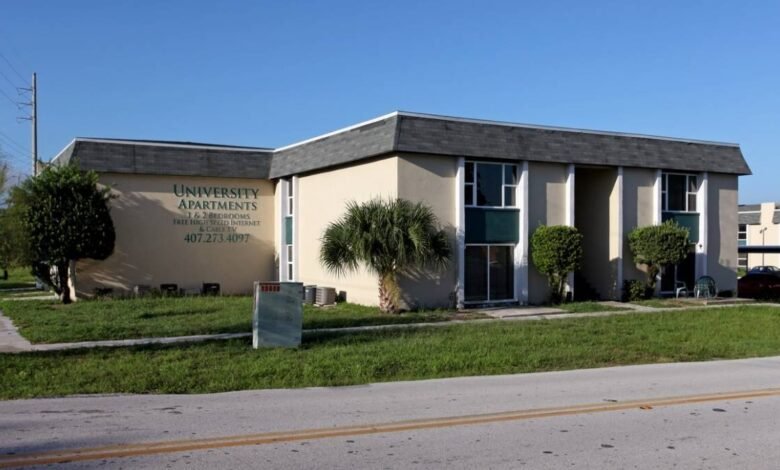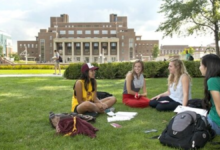5 Essential Tips for Finding the Perfect University Apartments

Finding the right University Apartments as a university student can be both exciting and daunting. It’s often the first taste of independence, but it also comes with significant responsibilities. Balancing location, budget, and amenities while managing a busy academic schedule can be challenging. The right apartment can enhance your university experience, providing a conducive environment for studying and socializing. To help you navigate this important decision, here are five essential tips for finding the perfect university apartment.
1. Start Your Search Early
One of the most critical steps in finding the perfect University Apartments is to start your search early. The demand for student housing, especially near popular universities, can be fierce. Many students begin looking for apartments several months before the start of the academic year, and delaying your search can leave you with limited and less desirable options.
Starting early has several advantages:
- Wider Selection: Early birds have access to the widest selection of apartments, allowing you to choose the one that best suits your needs in terms of location, price, and amenities.
- Lower Stress Levels: Searching early means you have ample time to explore various options without the pressure of an impending move-in date. This can help reduce stress and allow you to make a more informed decision.
- Roommate Coordination: If you plan to live with roommates, starting early gives you more time to coordinate with them, align schedules for apartment visits, and ensure everyone is on the same page regarding budget and preferences.
- Better Deals: Some landlords and property managers offer early-bird discounts or incentives for signing a lease in advance. By starting your search early, you might secure a better deal on rent or a waived application fee.
To start your search, make a list of potential neighborhoods that are convenient for commuting to your university. Use online platforms, join social media groups dedicated to university housing, and contact local property management companies. Also, attend housing fairs organized by your university if available, as they can be a valuable resource for finding student-friendly apartments.
2. Set a Realistic Budget
Establishing a realistic budget is one of the most crucial aspects of finding the right apartment. Rent is often the most significant expense for university students, and it’s essential to determine what you can afford before beginning your search. When setting your budget, consider not only the rent but also additional costs such as utilities, internet, transportation, groceries, and other living expenses.
Here are some tips to help you create a realistic budget:
- Calculate Your Monthly Income: Start by listing all your sources of income, such as part-time jobs, scholarships, parental support, or student loans. This will give you a clear picture of how much money you have available each month.
- Apply the 30% Rule: A common rule of thumb is to spend no more than 30% of your monthly income on rent. This helps ensure that you have enough money left over for other necessities. For example, if your monthly income is $1,500, aim to keep your rent below $450.
- Include Additional Costs: Don’t forget to account for utilities (electricity, water, gas), internet, and any other recurring expenses. Some apartments include utilities in the rent, while others do not, so it’s crucial to factor in these costs when comparing rental prices.
- Budget for Emergencies: Unexpected expenses can arise, such as medical emergencies, car repairs, or replacing a lost textbook. Set aside a small portion of your budget each month for these unforeseen costs to avoid financial stress.
- Be Realistic About Lifestyle Costs: It’s easy to overlook lifestyle expenses like dining out, entertainment, or weekend trips. Be honest about your spending habits and ensure your budget reflects these activities.
Sticking to a well-planned budget will help you avoid the financial strain that can come with overspending on rent, allowing you to enjoy your university experience without constantly worrying about money.
3. Prioritize Location and Safety
The location of your apartment can significantly impact your university experience. A great location should balance convenience, safety, and affordability. Here are some key considerations when evaluating potential locations:
- Proximity to Campus: Living close to campus can save you valuable time and reduce commuting costs. This is especially important if you have early morning classes or tend to spend long hours at the library. Apartments within walking or biking distance are ideal, but if that’s not feasible, look for options near reliable public transportation.
- Safety of the Neighborhood: Safety is paramount when choosing an apartment. Research crime rates in the area and consider factors such as lighting, secure building entrances, and the presence of security personnel. If possible, visit the neighborhood at different times of the day to gauge how safe it feels.
- Access to Amenities: Consider the proximity of essential amenities such as grocery stores, pharmacies, restaurants, and healthcare facilities. Living in an area with easy access to these services can save you time and make daily life more convenient.
- Noise Levels and Atmosphere: The atmosphere of the neighborhood can affect your ability to study and relax. Areas near bars, clubs, or busy roads may be noisy and disruptive, making it difficult to focus. On the other hand, neighborhoods that are too quiet or far from social hubs might feel isolating. Try to find a balance that suits your lifestyle.
- Transportation Options: Even if you have a car, it’s essential to consider public transportation options, especially if parking is limited or expensive. Easy access to buses, trains, or bike lanes can make commuting more manageable and reduce your overall transportation costs.
Choosing the right location is about finding a neighborhood that feels safe, offers the amenities you need, and provides convenient access to your university and other aspects of your daily life.
4. Evaluate Apartment Features and Amenities
When selecting an apartment, it’s important to evaluate the features and amenities offered to ensure they meet your needs. While some amenities may seem like a luxury, others can significantly enhance your living experience as a student. Here are some features to consider:
- Furnished vs. Unfurnished: A furnished apartment can save you money on buying furniture and make moving in much easier. However, furnished apartments may have higher rents. Unfurnished apartments offer more flexibility in terms of personalization and are generally less expensive.
- In-Unit Laundry: Having access to in-unit or on-site laundry facilities can be a major convenience. It saves you time and money compared to using laundromats, which can be a hassle, especially during exam periods.
- Internet and Wi-Fi: A reliable internet connection is essential for any student. Check if the apartment provides high-speed internet or if you need to set it up yourself. Some apartments include internet in the rent, which can be a cost-effective perk.
- Study Space and Natural Light: Look for apartments with adequate natural light and a quiet space where you can study. A bright, airy environment can boost your mood and productivity, making it easier to concentrate on your studies.
- Parking and Transportation Access: If you have a car, check the availability and cost of parking. Some apartments charge extra for parking spaces, while others may have limited availability. Additionally, ensure the apartment is well-connected to public transportation if you rely on it for commuting.
- Gym and Recreational Facilities: Access to a gym, pool, or common recreational areas can add value to your living experience. These amenities provide convenient options for staying active and socializing without having to leave the apartment complex.
- Pet Policy: If you have a pet or plan to get one, check the apartment’s pet policy. Some places allow pets with an additional fee or deposit, while others have strict no-pet policies.
Weigh the pros and cons of each amenity against your budget and lifestyle needs to determine which features are essential for your university apartment.
5. Review Lease Terms Carefully
Before signing a lease, it’s crucial to review all the terms carefully. A lease is a legally binding contract, and understanding its conditions can save you from future disputes or unexpected costs. Here are some key points to consider when reviewing a lease:
- Length of Lease: Most leases are for 12 months, but some landlords offer shorter leases or month-to-month options. Make sure the lease length aligns with your academic schedule and personal plans.
- Security Deposit and Fees: Understand the upfront costs, including the security deposit, application fees, and any other charges. Ask about the conditions for getting your security deposit back when you move out.
- Maintenance and Repairs: Check who is responsible for maintenance and repairs. Some leases require tenants to handle minor repairs, while others cover everything. Make sure you know what to do if something breaks or needs fixing.
- Subletting and Lease Breakage: Life is unpredictable, and you may need to move out before your lease ends. Check the policy on subletting or breaking the lease. Some landlords allow subletting, while others may charge a fee for early termination.
- Rules and Restrictions: Be aware of any rules regarding noise, guests, smoking, and other behaviors. Violating these rules could result in fines or even eviction.
- Rent Payment Details: Make sure you understand how and when rent is due, acceptable payment methods, and any late fees that may apply.
It’s always a good idea to ask questions if any part of the lease is unclear. Don’t hesitate to negotiate terms or seek legal advice if needed. Understanding your lease ensures that you’re fully aware of your rights and responsibilities as a tenant.
Conclusion
Finding the perfect university apartments requires careful planning, research, and attention to detail. By starting your search early, setting a realistic budget, prioritizing location and safety, evaluating amenities, and thoroughly reviewing lease terms, you can secure an apartment that meets your needs and enhances your university experience. This milestone is more than just finding a place to live—it’s about creating a comfortable, safe, and supportive environment where you can thrive academically and personally. With these tips in mind, you’ll be well on your way to finding the ideal apartment for your university journey.




